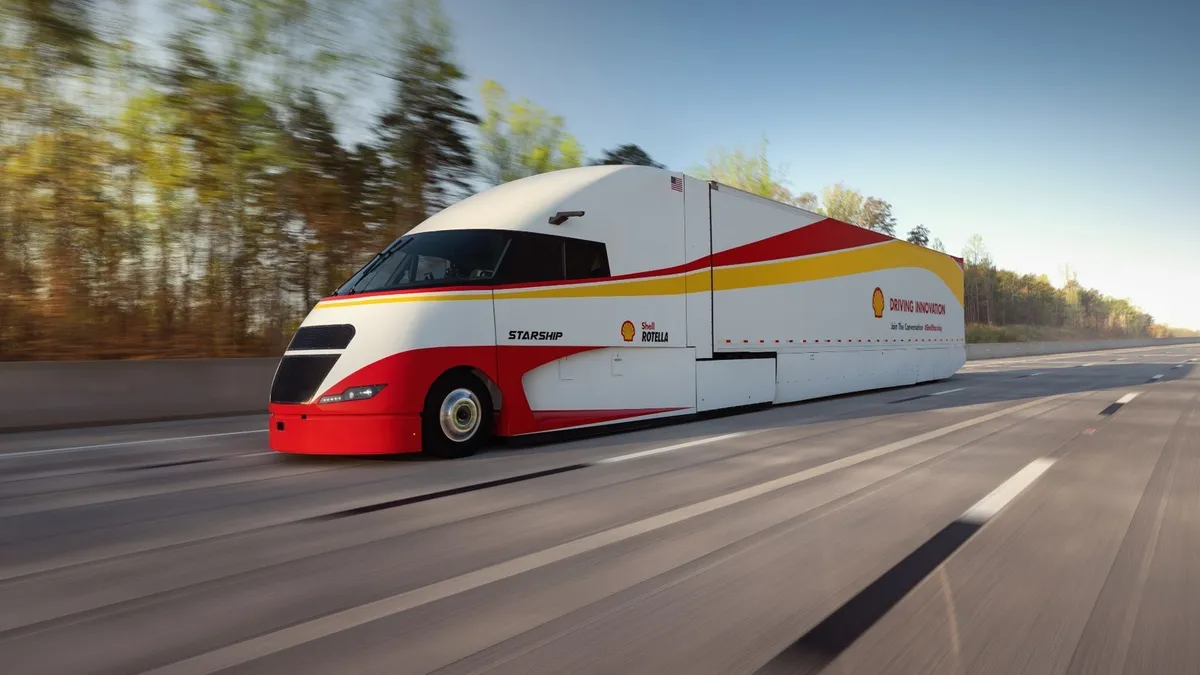Dive Brief:
- The Shell Starship 2.0 tractor-trailer, a prototype Class 8 the company is developing with technology that can increase fuel efficiency in diesel-powered trucks, posted a score of 10.8 miles per gallon on a cross-country journey from San Diego, California, to Jacksonville, Florida, earlier this year.
- In a press release, Shell said the test was an improvement from its 2018 run, when the Starship 1.0, as it was known then, got 8.94 MPG. Both performances are better than the 6.4 MPG average of North American fleets, Shell officials said. Shell noted the 2.0 actually carried more weight than the 2018, version, increasing the payload by 18%, from 39,900 pounds of clean reef material in 2018 to 47,100 pounds in 2021.
- Shell displayed the Starship 2.0 at the Advanced Clean Transportation Expo, which is traditionally a show for OEMs and suppliers that aim for zero emissions. As fleets make the long-term transition to battery-electric vehicles and fuel-cell electric vehicles, the innovations that the Starship 2.0 made could remove 275 million tons of carbon annually, if adopted by every fleet in North America, Shell said.
Dive Insight:
The sleek tractor-trailer, designed by Shell engineers, has white skirts along its trailer, an aerodynamic design, a 5,000-watt solar panel atop its trailer to charge the battery, a redesigned powertrain configuration to reduce torque, and advanced lubricants to reduce engine friction, according to the company.
The engineers did not start from scratch. They used a Navistar Class 8 body and parts from Meritor. But the company is not trying to become an OEM, a Shell official told Transport Drive at ACT Expo in Long Beach, California.
What Shell is trying to do is offer a bridge to the zero-emissions future by noting an efficient Class 8 national fleet could save millions of gallons of diesel per year.
Few attendees at ACT Expo expressed a belief to Transport Dive that BEV and FCEV technologies would be ready for large-scale adoption within 10 years. Some even said the future of trucking will be a mix of electric, hydrogen, natural gas, propane and, yes, diesel.
As a result, many of the ACT Expo exhibitors were there to compete with battery and hydrogen advocates and OEMs. One such group was the Propane Education and Research Council, which said propane can offer fleets in the medium-duty space savings over electric and FCEVs, while cutting carbon emissions.
Natural gas also had advocates at ACT Expo, with Hyliion's CEO predicting the clean-burning fuel will likely stick around.
Hyliion retrofits Class 8 models by using a natural gas generator, generating electricity on-board. The OEM was able to go to market as a publicly traded company in June 2020 by merging with Tortoise Acquisition. Thomas Healy, CEO of Hyliion, told an expo panel that the future of green trucking will likely be a mix of options, just as trucking fuel is diverse now.
The North American Council for Freight Efficiency monitored the freight runs. Shell officials said they also did a second shorter run of 400 miles to get additional data on a more typical payload of 17.5 tons. Shell said the average fuel economy obtained on the shorter run was 12 MPG.












